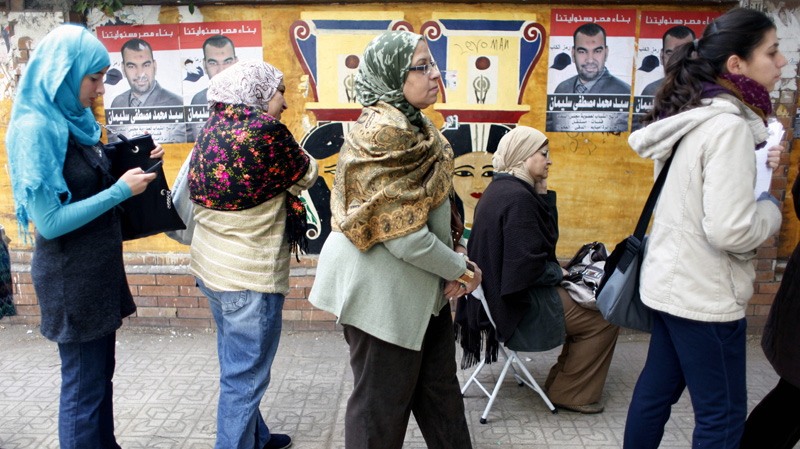
Voting is in progress in nine governorates for the second stage of parliamentary elections, in which 3,387 candidates are competing for 180 seats. There were widespread reports of illegal campaigning outside of polling stations and scattered fights between supporters of rival candidates, particularly members of the Brotherhood’s FJP and Salafi Nour Party.
PROTESTS:
1) Hundreds of protesters are continuing their sit-in outside of the Cabinet building for a third consecutive week, despite efforts by stick-wielding thugs to disperse the demonstration by force on December 14. [al-Dostour, Arabic, 12/14/2011]
ELECTIONS:
2) Voting is in progress in nine governorates for the second stage of parliamentary elections. 180 seats are being contested by 3,387 candidates in Giza, Beni Sueif, Sohag, Aswan, Menoufiya, Sharqiya, Beheira, Ismailia and Suez. According to official figures, 18.7 million Egyptians will be eligible to vote in this stage with 355,000 Egyptians expatriates – most of them residing in the Gulf countries – registered to vote in the second round. [al-Ahram, English, 12/14/2011]
3) As voting began, there were widespread complaints of illegal campaigning outside of polling stations. In Giza’s Waraq district, a judge halted the voting process temporarily due to campaigning by Nour and FJP party representatives. There were also reports of delays in opening at least 39 polling stations and two gunfights between supporters of rival candidates near Cairo and Suez City. Security forces closed a polling station in one Giza village after an armed scuffle between rival campaign workers. The Freedom and Justice Party’s (FJP) "elections operation room" has accused Egyptian Bloc supporters of violating electoral rules and campaigning outside polling stations in Ismailiya. The FJP statement also accused judges in some polling stations in Ismailiya and Sohag of preventing party representatives from entering polling stations, despite having official permits. Meanwhile, the Revolution Continues Alliance (RCA) has accused FJP representatives of illegal campaigning, particularly in Beheira. In Hosni Mubarak’s hometown of Menoufiya – a former NDP stronghold – Salafi and FJP candidates are engaged in fierce competition over the governorates 16 list-based and 8 single-winner seats. [Reuters, English, 12/14/2011] [al-Ahram, English, 12/14/2011] [al-Masry al-Youm, English, 12/14/2011] [al-Masry al-Youm, English, 12/14/2011] [al-Masry al-Youm, Arabic, 12/14/2011]
4) Earlier this week, the High Electoral Commission decided to postpone voting for list-based seats in three districts in the governorates of Beheira, Sohag and Menoufiya until December 21-22 after an administrative court ruling combined some of the party lists in those districts, requiring the reprinting of ballots. [al-Masry al-Youm, English, 12/14/2011]
ISLAMISTS:
5) After casting his ballot in Giza, the FJP’s deputy head and parliamentary candidate, Essam al-Arian, predicted, “The FJP will win a larger proportion of seats during the second round of elections.” [al-Masry al-Youm, English, 12/14/2011]
6) The liberal-oriented Egyptian Bloc is struggling to regroup after its disappointing performance in the first round, but the coalition still seems to be losing ground in competition with the more organized and aggressive campaigns of the FJP and Salafi Nour Party. Tarek Beshry, a member of the Free Egyptians Party – which heads the Egyptian bloc – reportedly stormed into the coalition’s Suez office and admitted, “We are very weak. The [FJP] is doing so well campaigning. We have to do something about it.” Beshry brought a group of volunteers from Cairo to help out at the polls in Suez. Meanwhile, an Egyptian Bloc candidate Mahran Abdel Hamid Mahran said, “The FJP is influencing voters in the lines and we need to be there to balance.” [al-Masry al-Youm, English, 12/14/2011]
U.S. POLICY:
7) Ambassador Anne Patterson described Egypt’s elections as “highly successful” and said, “The US will deal with any party chosen by the Egyptian people.” [al-Ahram, English, 12/14/2011]
8) Walter North, head of the USAID mission in Egypt, said that the United States respects the democratic process in Egypt and is willing to deal with any party brought to power by the people, as long as they do not resort to violence to achieve their objectives. [al-Shorouk, Arabic, 12/14/2011]
NEW CONSTITUTION:
9) The FJP-led Democratic Alliance for Egypt is drafting a “preliminary paper” to be presented to the constitutional committee tasked with drafting Egypt’s new constitution. The document will propose constitutional amendments to restrict the powers of the president and introduce a mixed presidential/parliamentary system, whereby the president would handle foreign policy and national security, and the prime minister would deal with internal affairs. [al-Masry al-Youm, English, 12/14/2011]
HUMAN RIGHTS:
10) Coptic blogger and activist Maikel Nabil was sentenced to two years in prison by a military court, concluding a case that has been adjourned five times over the past several months. Nabil was originally sentenced to a three-year prison term in April after criticizing the military’s handling of the transition in a blog post entitled, “The army and the people were never one hand.” [al-Ahram, English, 12/14/2011]
11) A court ruled on December 11 to allow detained blogger-activist Alaa Abdel Fattah to vote, and the High Electoral Commission announced that a special committee will be dispatched to collect his ballot from prison. Fattah has been an outspoken critic of the use of military courts to prosecute civilians. [al-Ahram, English, 12/14/2011]
Photo Credit: Associated Press
Image: 800_mideast_egypt_election_111213.jpg

